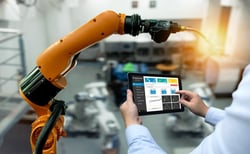Distributed control system (DCS) engineers are technical system design and process management experts. DCS engineers ensure the effective and efficient operation of distributed control systems, for example of a water treatment plant or chemical plant. They provide technical expertise regarding the system’s design, implementation, maintenance, and improvement. This work includes selecting and integrating computer hardware, software, and network components, as well as programming and configuring the system.
DCS engineers are furthermore responsible for consistently monitoring the distributed control system's performance and making necessary adjustments to ensure optimal operation. Part of a typical DCS engineer’s job description is the responsibility to create and maintain documentation about the DCS system, including user manuals, operating procedures, and training materials. DCS engineers often provide technical support to customers, including assisting with system operation, troubleshooting, and answering questions about the system.
As technology evolves, DCS engineers will continue to be responsible for upgrading systems and modifying them to meet changing plant and process needs. Distributed control system engineers are all-around experts who are vital to supporting the running of a variety of industrial processes and systems. Popular sectors for distributed control system engineers to find work in include oil and gas, nuclear energy, chemical, paper and pulp, waste and water treatment plants, food processing, agriculture, and manufacturing.
Apply now for a job as a Distributed Control System Engineer!
Commissioning Engineer
Location: 's-Gravenhage
Branche: Energy Power Plants
Expertise: Engineering & Design
Experience: 1 years
Als International Commissioning Engineer Data Centers – Electrical werk je nauw samen met een team van specialisten om ervoor te zorgen dat datacenters optimaal functioneren. Jouw taken omvatten: Het voorbereiden, plannen en uitvoeren van de inbedrijfstelling van elektrische systemen in datacenters. Het uitvoeren van functionele tests en kwaliteitscontroles. Het analyseren en oplossen van technische problemen ter plaatse. Het samenwerken met lokale en internationale teams om ervoor te zorgen dat projecten volgens planning en specificaties worden voltooid. Het opstellen van technische rapportages en documentatie. Het toezien op naleving van normen, regelgeving, wetten, kwaliteit en EHS-richtlijnen. Het fungeren als de technische vertegenwoordiger van de klant op locatie en deelnemen aan diverse commissievergaderingen en andere besluitvormingsmomenten. Het uitvoeren van site-administratieve taken zoals het plannen van werkzaamheden, het bijwerken van tekeningen in lijn met wijzigingen op locatie en het sluiten van openstaande punten in het inbedrijfstellingssysteem.
Test Engineer
Location: Beernem
Branche: Electronics
Expertise: Engineering & Design
Experience: 1 years
Als Test/ Application Engineer ben je verantwoordelijk voor het ontwerpen en ontwikkelen van functionele testapplicaties en fixtures in de elektronica- en elektrische sector. Je ontwikkelt elektronische fixtureschema’s en kleine PCB-units. Je ondersteunt ook bij de installatie en opstart van de applicaties, zowel lokaal als bij klanten. Daarnaast neem je verantwoordelijkheid voor de naleving van kwaliteits- en veiligheidsmaatregelen. Gelukkig kunnen we ook op jou rekenen bij het:Debuggen van hard- en software.Bijdragen aan continue verbetering van kwaliteits- en veiligheidsmanagementsystemen.
Mechanical engineer
Location: Genk
Branche: Industrial Services
Expertise: Engineering & Design
Experience: 2 years
Je bent verantwoordelijk voor de mechanische ontwikkeling van automatische machines die worden gebruikt voor de productie en het testen van elektronische PCB's en modules. Klantenspecificaties vertaal je naar interne ontwerpspecificaties en werk je uit tot technische concepten die binnen het kostenbudget passen. Je coördineert de technische detaillering van ontwerpen als deelprojectverantwoordelijke en begeleidt de machinebouw van realisatie tot vrijgave bij de klant. Je waarborgt de kwaliteit en tijdigheid van het volledige ontwikkelproces. Gelukkig kunnen we ook op jou rekenen bij het:Opstellen en beheren van productdocumentatie.
Electrical Interface Engineer
Location: 's-Gravenhage
Branche: Energy Power Plants
Expertise: Engineering & Design
Experience: 1 years
Als Electrical Interface Engineer werk je nauw samen met het projectteam en de Lead Engineer om technische oplossingen te realiseren. Je bent verantwoordelijk voor: Ondersteunen van engineers binnen het project op technisch gebied. Oplossen en administratief afsluiten van restpunten. Meewerken aan detailontwerpen voor laag- en middenspanningsdistributiesystemen. Voorbereiden van werkpakketten voor installatie en inbedrijfstelling. Zelfstandig uitwerken van technische vraagstukken. Samenstellen van Operations & Maintenance manuals. Controleren van technische (fabrieks-) documentatie. Opstellen van technische specificaties en RFQ’s. Opleveren van technische documentatie aan de eindklant. Beheren en up-to-date houden van technische projectdocumentatie. Samenstellen van technische trainingen. Opstellen van test- en inspectieplannen.
Electrical Engineer
Location: Den Haag
Branche: Energy Power Plants
Expertise: Engineering & Design
Experience: 3 years
Develop comprehensive electrical or mechanical designs for E-houses. Investigate and advise on subjects such as mechanical or electrical interfacing, layouts, choice of components, fire safety, HVAC, electrical systems, cabling, and containment. Interface with colleagues on low voltage, medium voltage, and busbar systems. Review basic and detailed designs and project-related documentation. Proactively communicate with customers and suppliers on project-related aspects. Organize and attend Factory Acceptance Tests (FAT). Prepare technical documentation packages. Provide in-office support for production and on-site delivery. Ensure proper project closing and handover. Initiate and execute process, product, and project improvements.
Common DCS engineer roles and responsibilities
A DCS engineer is responsible for performing a range of important technical and engineering tasks. Responsibilities may include:
- Designing and implementing distributed control systems for industrial processes;
Developing software to manage systems and processes; - Ensuring systems are properly installed and configured, and that all components are working correctly, such as through troubleshooting;
- Conducting system maintenance, upgrades and modifications, including supervising contractors who work on controls systems;
- Managing projects related to the implementation and maintenance of distributed control systems, including budgeting, scheduling, and resource allocation;
- Preparing technical documentation as needed and giving trainings on DCS operations to colleagues as needed;
- Coordinating operations with internal and external teams, with ability to also lead teams in order to design and implement complex engineering solutions across all aspects of a large project;
- Providing customer support on distributed control systems;
- Safeguarding DCS security at all times;
- Ensuring safety and compliance in line with industry regulations and standards;
Qualifications for distributed control system engineer
A successful DCS engineer should have at least a Bachelor's degree in Engineering, Electronics, Computer Science, or related technical field. Supplementary training in mathematics or programming is also beneficial to those working in this field, and a Master’s degree is an advantage.
Additional supporting skills and experience include:
- 2-4+ years of related DCS engineering experience;
- Excellent applied math and technical skills;
- Proficiency in using latest DCS computer hardware and software, with a proficient knowledge of PLCs/SCADA/HMI programming languages such as Ladder Logic, Structured Text, Function Block Diagrams, and related;
- Experience in team and project management;
- Knowledge of latest cybersecurity standards;
- Strong verbal and written communication skills to be able to work easily with other engineers, technicians, and customers;
- Some work experience gained through an apprenticeship or in a relevant role is an advantage;



